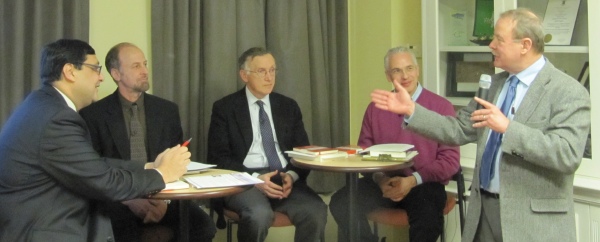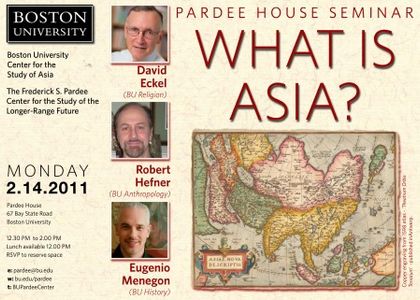What is Asia?
On Monday, February 14, 2011, The Frederick S. Pardee Center for the Study of the Longer-Range Future held a lunch seminar on ‘What is Asia?’. Part of the ‘Pardee House Seminars’ series, the event featured Prof. David Eckel (BU Religion), Prof. Robert Hefner (BU Anthropology) and Prof. Eugenio Menegon (BU History), and was moderated by Prof. Adil Najam, Director of the Pardee Center and introduced by Prof. Joseph Fewsmith, Director of the BU Center for the Study of Asia.

This seminar was organized in collaboration with the Boston University Center for the Study of Asia (BUCSA). The panel continued on the theme of BUCSA’s 2009 conference which was titled “The Idea of Asia” and began the discussion in light of the recent special issue of the Journal of Asian Studies which included a forum of special articles on the ‘meaning’ of Asia. The seminar also looked at what an Asian identity might mean in the future and in the context of what is already being called by some as an ‘Asian Century.’
 Eugenio Menegon is Professor of History at Boston University. He teaches courses in Chinese history (premodern and modern periods) and in World History. He started the seminar by providing a history of the term “Asia” and explained the trajectory of Asian identity as a region. He also discussed the different approaches to the study of Asia and provided a summary of scholarly works on the idea of Asia.
Eugenio Menegon is Professor of History at Boston University. He teaches courses in Chinese history (premodern and modern periods) and in World History. He started the seminar by providing a history of the term “Asia” and explained the trajectory of Asian identity as a region. He also discussed the different approaches to the study of Asia and provided a summary of scholarly works on the idea of Asia.
Malcolm David Eckel is Professor of Religion and Director of the Core Curriculum at Boston University. Prof. Eckel suggested using various religious philosophies in Asia to view the idea of Asia. In particular, he demonstrated the use of three Buddhist concepts to consider the idea of Asia. He also argued for giving a greater role to Asia and the study of Asia in the university and its curriculum.
Robert W. Hefner is Professor of Anthropology and Director of the Institute on Culture, Religion, and World Affairs (CURA) at Boston University. He pointed out the focus of the “new” Asia is on how to live together, given that Asia, as a region, is pluralized and diverse. He also highlighted three currents that will define the future of Asia – 1) economic integrations, 2) culture and entertainment and 3) religious resurgences. Prof. Hefner concluded his opening remarks by pointing out that the concept of Asia is not an artificial construct but a reality.
Following the presentations the audience engaged in a lively discussion with the panelists. Prof. Najam began the Q&A session by asking if religion is a unifying or dividing force in Asia. Some of the other issues discussed included further discussion on the idea of other regions such as Africa and Europe, the possibility of Asia integration and the impacts of the rise of Asia: both within and outside the continent.